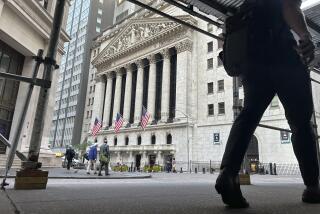Dow rallies after sharp early drop
- Share via
NEW YORK — Stocks staged a late rally Friday on a revival of hope for a government rescue of the financial system, but the jittery credit markets remained on edge.
The Dow Jones industrials dropped more than 150 points in the first few minutes of trading after lawmakers reported Thursday night that talks on a bailout bill had stalled. But the market began to recover after President Bush predicted a plan would be enacted.
“There are disagreements over aspects of the rescue plan, but there is no disagreement that something substantial must be done,” Bush said.
The Dow finished up 121.07 points, or 1.1%, at 11,143.13. The Standard & Poor’s 500 index climbed 4.09 points, or 0.3%, to 1,213.27, while the Nasdaq composite index edged down 3.23 points, or 0.1%, to 2,183.34.
Despite the advances in the Dow and S&P; 500, declining issues outnumbered advancers by more than 2 to 1 on the New York Stock Exchange.
For the week, which saw four triple-digit moves in the Dow, the blue-chip average lost 2.2%, the S&P; 500 declined 3.3% and the Nasdaq fell 3.4%.
Stocks of financial companies -- which could benefit from a bailout -- surged 3.2%, the biggest gain among the 10 broad industry groups in the S&P; 500.
But shares of some banks weighed down by troubled mortgage assets tumbled after the seizure late Thursday of Washington Mutual’s bank unit and its immediate sale to JPMorgan Chase.
Newport Beach-based Downey Financial plunged 48%, Los Angeles-based FirstFed Financial sank 45% and Charlotte, N.C.-based Wachovia slumped 27%. All three have large portfolios of risky “pay option” adjustable-rate mortgages.
But stocks of some other banks rose sharply. JPMorgan surged 11%, Wells Fargo shot up 9% and Bank of America rose 7%.
Washington Mutual shares, which could be made worthless by the government seizure, skidded 91% to 16 cents a share. A year ago, they were trading above $35.
However, the credit markets remained under pressure as investors huddled in the safety of Treasury securities, and banks continued to conserve cash.
The annualized yield on the three-month Treasury bill rose slightly to 0.85% from 0.76% late Thursday but remained far below its level of much of the last three months, when it was running above 1.5%.
“The credit markets are still upside down . . . and they remain under enormous stress,” said Michael Darda, chief economist at MKM Partners, an institutional brokerage in Greenwich, Conn.
In other market highlights:
* Technology shares fell sharply after Research in Motion warned that its gross profit margin would contract in the current quarter because of the cost of producing three new BlackBerry models. Research in Motion fell 27%. Motorola, the biggest U.S.-based mobile-phone maker, lost 3.1%. Citigroup downgraded Research in Motion and Motorola to “hold” from “buy,” citing the potential for “severe price competition” in the industry.
* Uncertainty over the bailout package left the dollar mixed against other major currencies. Gold prices rose.
* Oil futures fell $1.13 to settle at $106.89 on the New York Mercantile Exchange.
* The Russell 2,000 index of smaller companies fell 0.95 of a point, or 0.1%, to 704.79.
* Overseas, key stock indexes fell 0.9% in Japan, 2.1% in Britain, 1.8% in Germany and 1.5% in France.
--
The Associated Press was used in compiling this report.
More to Read
Inside the business of entertainment
The Wide Shot brings you news, analysis and insights on everything from streaming wars to production — and what it all means for the future.
You may occasionally receive promotional content from the Los Angeles Times.










